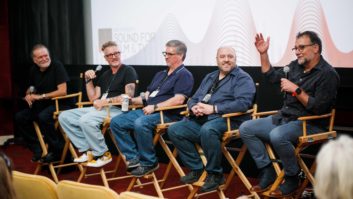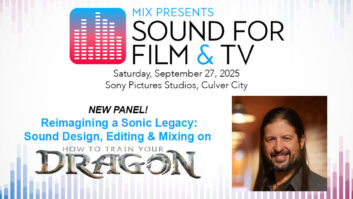Ira Blonder, Sound Kitchen owner,
in his office, which overlooks the
“Big Boy” mascot of the main
tracking space.
By Frank Wells.

Franklin, TN–The Sound Kitchen studios–some 19,000 sq. ft. across seven studios, anchored by the API Legacy-equipped, 3,000 sq. ft. Big Boy room and billed as the largest studio complex in the Southeast–has been under new ownership since last spring, the troubled transition not a harbinger of the current economic climate, but rather the result of a breakdown in the previous ownership’s partnership.
“I bought this first and foremost to preserve the Kitchen,” owner Ira Blonder, tells PSN. Originally involved to help avoid a bank shutdown of the Sound Kitchen (based on the bank not wanting to assume liability in the face of the crumbling partnership, though the business was in the black), commercial real estate service provider The Blonder Group, acquired the facility directly and has merged its offices with the Kitchen’s administrative space. PSN sat down with Blonder in early November. The full transcript of that conversation follows:
PSN: The rumor mill has indeed run rampant over changes at the Sound Kitchen. Addressing the rumors directly, here’s number one: There’s a For Lease sign out front, and that’s drawn speculation that the building’s shutting down and you’re looking to gut the studios and make them into office space.
IB: If that were the case, I would’ve let the bank gut the building and turned it into an operation center, but no, I took the responsibility and stepped forward to preserve what’s here, preserve the legacy of the Kitchen. It represents much too much to this community as the size facility it is as much as what it represents historically over these last 14-15 years.
PSN: You told me as we walked through the facility that the 6,000 square feet available is not part of the core facility. It is part of the expanded space, which does include some studio space now, but could be renovated for other purposes, along with another space available for a “build-to-suit” tenant. What kind of tenants would you like to see in these spaces?
IB: My purpose would be to go back to a regressive platform; if you remember back in the 40’s, when you went to a film studio, Paramount or whatever, you had the directors and the actors, and you had filmmakers borrowing actors and writers from each other. That’s what I want to create here. This is more about an entertainment campus as opposed to it being a studio. My ideal tenant, which we are talking with right now, is a label and they have a strong publishing catalog and they have a need for a studio on an ongoing basis. They would take all the surplus office space that we have, plus one of the studios, and make that part of their space. That still does not prohibit me from using one of the other studios at any time; it’s still available out there for lease. And the additional pad site we have is a large green area that is just vacant right now but has been approved for about a 5,000 square foot pad or building. So we can literally create a new building for someone onsite that has a relationship to the entertainment business. It could be a film and scoring studio; it could be anything like that whatsoever. It has to have that common bond in the entertainment field, and if there is a direct connection, they would have a use of the facility as part of their ongoing business.
PSN: The next rumor to address–you’re in such financial trouble that you’re having to sell off equipment like your SSL 9000.
IB: It’s almost hysterical, because I think there are small minds in this world and they have much too much time on their hands to worry about what I’m doing with my business. If they want to have an interest in my business, let them come here and write their check, okay? The answer is, it [the SSL] did not fit the model of where we’re going. It was a purely unique piece of equipment. There are only a few people in town that know how to use it [and] it wasn’t being used that much in the course of the last year or so. That’s really what it was. For me, it’s about a reconfiguration of a room.
One of the things that I’ve often talked about is starting to invest in film and scoring and 5.1 Dolby and 7.1 Dolby and moving into that realm and honestly, that room is a room that I’d like to reconfigure. Right now, while it’s blank and we’re figuring out where we go, it’s set up as a writer’s room. It’s available for the community to come in with the eventual hope that they would record with us, but it’s open for booking on that basis and at this point, there’s no charge for that. It’s more a community asset and that’s the way I view it. If I can help create some stimulus–some opportunities where writers don’t have a spot, or they’re engineering out of their homes and they want to come in–[I’d] really try to generate some of that excitement the way it used to be. I view what we’re doing here as more regressive than progressive, and that goes back to the model of the Brill Building or Motown, where there was such a creative force emanating from it and you didn’t have to worry about filling a room or not.
I don’t want to be a hotel; that’s not what this is about. Hotels are all about vacancy factors. I obviously come from a real estate background, so I view this as an opportunity, just a blank platform [from which] to grow. We’ll never change out the Big Boy. That is an extraordinary room, extraordinary sound. [Studio] E is another one. If anything, we’re improving. We’ve already put new equipment in there. Yeah, “we’re going out of business.” I just dropped about 30 or 40 grand in new equipment–things that were desperately needed here that were neglected, and things that the engineers who work here have said are important. Brand new Aeron chairs and foolish things like boom mics and microphones–things that they needed here but just were never investing in.
So, to me, that model of how a studio has operated is broke. Am I the right person coming from outside the recording industry to fix it? I don’t know if I can ever fix it. I think I can help evolve this facility.
[Blackbird Studios owner] John McBride does a phenomenal job doing what he does. I just admire him greatly and the engineers that he’s got in there and the room designs and how his model is completely contrary to mine. His vintage equipment side is extraordinary. But that’s not my model. I don’t even consider him competition or me competition to him. To me, it’s about [a] completely different philosophy, and that’s where we’re going with this. So if the rumor mill wants to talk about my selling off… What’s going to happen when I go and build 5,000 feet or bring a label in here and it adds such tremendous value, or we bring on somebody like Teddy Gentry as our artist-in-residence, and put together writer’s events and publishing events?
PSN: Tell me about the Teddy Gentry relationship. What does that bring to you and what are you giving to him?
IB: Well, Teddy and I have talked about exploiting a number of opportunities. Possibly looking at doing some publishing together–we’ve just done a co-publishing deal on a song he’s just released–and hopefully working on some artist development, possibly doing some internal projects, [for instance,] taking dark time and utilizing that dark time in the form of trying to invest back and take some of this talent–this raw, beautiful talent that’s just floating around–and give it a voice. [Consider] Teddy’s experience, his success, his artistry, and the opportunity to work with a Hall of Famer and [such] an artist, and who he is as a person. ….You know, there are some people who have huge, huge, huge egos. Teddy is not one of them. He is probably one of the nicest souls I think I’ve ever had the opportunity to be around, and it’s very evident in how he conducts his business and who he does business with. So we’re honored to have him as an artist-in-residence here. We have three or four other people of that same ilk, with a tremendous history and success, and we’re talking about bringing them in as well and making this, again, the type of home where someone can book a studio and have a co-writing session with somebody of Teddy’s stature–and that doesn’t happen often.
That harkens back to exactly what I talked about earlier and that is: taking an artist, an A-List artist who still has a tremendous amount of music to write and to say as a voice, and have him help the next generation. That’s just the start of it. We’ll have a press release at some point, but I’m very quiet about what I do; I don’t announce things in advance. That’s probably a fault of mine–I don’t talk enough about it. I like to get things done, initiate the plan, see it through to success and then talk about that success. If you went to our website, you can go to the Blonder Group and just look at our successes. That’s how we base our success: on our clients’ success. So I try to let our successes speak for who we are and I don’t–I won’t–harken to a rumor mill. I’m doing what I do.
I love to have input from the community. It’s something I’ve asked for. When people have asked me, ‘What do you intend on doing?’ I said, ‘This is my idea.’ If the community’s interested and wants to open up–I’ve heard time and time and time again how important this facility is to Nashville as well to the Southeast area, and [how] it would’ve been a total disgrace if in fact the bank had come in and taken it at that time and sold off everything. It really would’ve been a huge blow to the Nashville community–but I stepped up. I put my money where my mouth is and if there are people out there that want to really have a detailed and honest conversation about how they can help and how they can help preserve and grow or [who] want to grow with us, that’s what I’m here for. I’m not about shutting people out. I’m about inclusion.
PSN: Rumor number three: You bought the Sound Kitchen just to flip it.
IB: That’s why my office is here. That’s why I’ve moved everything in, that’s why I’ve got pictures up on the wall–my wife is happy to have all this crapshoot I have off the walls of the house and my other office in Brentwood, and she’s happy to get these guitars out of storage so she can see them.
No, I bought this first and foremost to preserve the Kitchen. Secondly, I needed offices in this market. I’ve been here for 14 years and I plan to be here for the rest of my life. I’m not going anywhere. And if I would’ve flipped it–I had an opportunity before I even closed to flip it and declined. It would’ve put a substantial amount of money in my pocket. I declined. So that rumor number three, wrong. In the words of Waylon, “wrong.”
PSN: Number four: You chased all your quality staff away.
IB: No, we have not chased [away] our quality staff. The people that we have here are those that are willing to accept change and evolve. In fact, we just hired somebody last night: a very, very skilled engineer and artist, and he’s coming in. So, no–we’re like any business in transition. We slowly but surely pick away, and we still have quite a few of the people, staff, that come in, and the engineers are still here. There are a few that are gone–a few that can’t deal with ‘we changed the color of the courtyard or the building or don’t understand why I hung a picture where I want it to be because I thought I owned this.’ I have often said, ‘if they want to show me where they want to hang the pictures, write a check.’ At the end of the day, I have the ultimate responsibility of making this ‘a go.’ I’d love the opportunity of interacting with a lot of other people and making this even better than what I could imagine. So, the whole idea of chasing off our staff–absolutely not, it’s ridiculous.
PSN: Final rumor: You chased off good clients. Good long-term clients who say they won’t come back now.
IB: I have not heard that. I’ve heard again rumors and I don’t comment; I won’t stoop to that level. I’m sorry, I’m just going to take the high road and not even get involved in that. Yes, the rumor mills are rampant and to hell with them all if that’s the case and we’ll do our business.
It’s pettiness, it’s jealousy–idle hands and idle minds.
When this place was to be closed, here you had Tony Brown in the studio trying to finish [a project] and the bank says, ‘Shut him out.’ I stepped up, wrote my check, took responsibility, signed on long term and that’s what I am. Long term. You deal with any of my clients and you know, I’m like a little pitbull on the pant leg; I don’t let go. I make sure I work it. I’m here every single day. Someone’s got a problem? I’m here to deal with it. Someone’s got an issue? I’m here to deal with it. Will I accept the model that’s been evident for so long? Well, let me ask you a question: Are these labels running the same old model that they ran [in the past]? Are artists handling themselves the same way they did in the mid-80’s? Foolish [assumptions], like, I put a For Lease sign out front and who can’t read ‘for lease?’ [That means] we’re selling the whole building? Does that mean when a writer sells their publishing catalog they’re no longer writing? It doesn’t mean that I can’t lease my space. It’s frustrating because all we’re trying to do is accomplish a common good, and that is to preserve the facility and grow. And work with the times and evolve. As we’ve just evidenced last night [2008 presidential election night], change is inevitable. You can either change for the better or change for the worse. You can’t stand still. We’re not standing still, so let the rumors fly. We’ll just be here tomorrow and the next day and the next day, and we’re going to continually evolve until it reaches the point where I’m comfortable.
PSN: Earlier, you mentioned your philosophy for the facility as a concept. Can you quantify it in three or four sentences? What is your philosophy?
IB: More about the Kitchen becoming a broad-based entertainment platform that encompasses multi-genres. In other words, film, production, we’re doing private songwriting, corporate events here in a big way when it’s a down time, and working with taking execs on a fantasy camp-like basis. Again, giving work to the community, bringing in engineers, bringing in songwriters that maybe haven’t had the biggest hits, but they’re going to earn a damn good night’s work and they’re going to do something that they love and that’s creative. [We’re doing] all these things just to open the facility, instead of it being so cloistered and locked down. That doesn’t mean that these engineers and producers aren’t going to have their privacy, because there’s no conflict there. If there’s a group booking Big Boy, that’s locked down and there’s nothing that’s going to occur there. Same with all our seven studios here.
And [something that’s] encouraging, we’re working with a lot of groups outside of this market, encouraging them to come to Nashville, be with us, work with our engineers, work with our musicians, work with our writers, people that will learn [that] there’s a Teddy or somebody of that ilk here that they can co-write with. I mean, what kind of an opportunity does that represent? We’re building on that, and along the way, we’re bringing our interns and our assistant engineers into those bookings. We’re trying to encourage that they would allow our people to sit in and watch what occurred.
Eddie Kramer was here [for a Waves event]. Wonderful, wonderful event. What a joy to be around. One of the questions I asked him, I said, ‘how did you start?’ He said, ‘Well I was 16 years old and I walked in the studio and said I’ll do anything.’ Well, you can’t do that anymore. He said, ‘I learned at the elbow of some of the best people.’ I asked, ‘How did you hook up with Jimi Hendrix?’ He said, ‘I was just there when he walked into the door; little did I know…’ When you talk with Alan Parsons, same thing–he was just here. Again, he ran coffee. Those opportunities don’t exist anymore, so the way we are doing it is to bring our people in and to constantly educate them and let them see that they don’t just have their Waves certificate or their Pro Tools certificate and they’re out in the world. We’re going to give them real live experience, give them an opportunity to learn at the elbows of some of the best and to be productive. When the time comes and they go off and engineer on their own and they become an entity unto themselves, it’ll be because of what we accomplished here. That’s the same theory that I used when I looked at Ocean Way, when I was representing Gary Belz and Allen Sides with Ocean Way, [turning] that into a teaching facility. Belmont [with the help of] Mike Curb got it. They understood the value of not just living on the outskirts of Music Row, but being inclusive, in taking these students to a whole other level. So when asked about that situation and the first year, of course, Belmont was the pariah, but inevitably, [none of the negative predictions have] occurred. What has happened [is], it’s turned out some of the best engineers; some of the best producers, artists are coming out of there–people are drawn to Nashville from all over the world because of Belmont’s music program.
PSN: Mike Curb has continued on to purchase other of Music Row’s traditional mainstays, like the Masterfonics building and he’s…
IB: …preserving the Quonset Hut [credited as Music Row’s first studio]. He gets it. Same with Studio B. He gets it. Those things, once they’re gone–there was a car dealership that demo’ed out a studio that Elvis had sung in, without even a thought about what its worth could be. I’m sure if Mike hadn’t stepped up, similar situations could occur like that. But once you learn that the Number One studio, the reason why there is a Music Row–the Bradleys [Owen and Harold] built that studio–and the opportunity to put it back into circulation–for me, it’s an utter thrill to have been involved in the preservation of that. It’s funny that the knowledge of the Quonset Hut even being there was truly foreign to corporate.
PSN: After the property was sold to CBS/Columbia, they surrounded the studio with their headquarters, and it eventually housed their art department.
IB: It was just an art department, that’s right, but you could still go there and stand right where Patsy Cline stood and the reverb chamber is still there–I don’t sing and I don’t play and I don’t write, I don’t do any of this, but let me tell you something, I have an unreal appreciation for the artistry and what occurred in that studio. There’s one story that I loved about that [time]–a young kid that was running coffee and sweeping up, and his name was Kris Kristofferson. It’s also an honor for someone like Billy Sherrill to get his due [for] creating what he created there. [He was] was another extraordinary influence in music–just too many of those are leaving, and it’s a shame. You talk about the Nashville sound…







